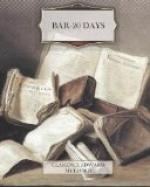“By the pans of Julius Caesar!” shouted the marshal. “I’ll put you to sleep so you’ll never wake up if I hears any more about you an’ yore two bits!”
“Show me, Rednose,” snapped the other, his gun out in a flash. “I want that cayuse, an’ I want it quick. You show me twenty-five dollars or I’ll take it out from under you on my bid, you yaller dog! Stop it! Shut up! That’s suicide, that is. Others have tried it an’ failed, an’ yo’re no sleight-of-hand gun-man. This is the first time I ever paid a hoss-thief in silver, or bought stolen goods, but everything has to have a beginning. You get nervous with that hand of yourn an’ I’ll cure you of it! Git off that piebald, an’ quick!”
The marshal felt stunned and groped for a way out, but the gun under his nose was as steady as a rock. He sat there stupidly, not knowing enough to obey orders.
“Come, get off that cayuse,” sharply commanded the stranger. “An’ I’ll take yore Winchester as a fine for this high-handed business you’ve been carrying on. You may be the local court an’ all the town officials, but I’m the Governor, an’ here’s my Supreme Court, as I was saying to the boys a little while ago. Yo’re overruled. Get off that cayuse, an’ don’t waste no more time about it, neither!”
The marshal glared into the muzzle of the weapon and felt a sinking in the pit of his stomach. Never before had he failed to anticipate the pull of a gun. As the stranger said, there must always be a beginning, a first time. He was thinking quickly now; he was master of himself again, but he realized that he was in a tight place unless he obeyed the man with the drop. Not a man in town would help him; on the other hand, they were all against him, and hugely enjoying his discomfiture. With some men he could afford to take chances and jerk at his gun even when at such a disadvantage, but—
“Stranger,” he said slowly, “what’s yore name?”
The crowd listened eagerly.
“My friends call me Hopalong Cassidy; other people, other things—you gimme that cayuse an’ that Winchester. Here! Hand the gun to Fisher, so there won’t be no lamentable accidents: I don’t want to shoot you, ’less I have to.”
“They’re both yourn,” sighed Mr. Townsend, remembering a certain day over near Alameda, when he had seen Mr. Cassidy at gun-play. He dismounted slowly and sorrowfully. “Do I—do I get my two bits?” he asked.
“You shore do—yore gall is worth it,” said Mr. Cassidy, turning the piebald over to its overjoyed owner, who was already arranging further gambling with his friend, the bartender.
Mr. Townsend pocketed the one bid, surveyed glumly the hilarious crowd flocking in to the bar to drink to their joy in his defeat, and wandered disconsolately back to the pound. He was never again seen in that locality, or by any of the citizens of Rawhide, for between dark and dawn he resumed his travels, bound for some locality far removed from limping, red-headed drawbacks.




